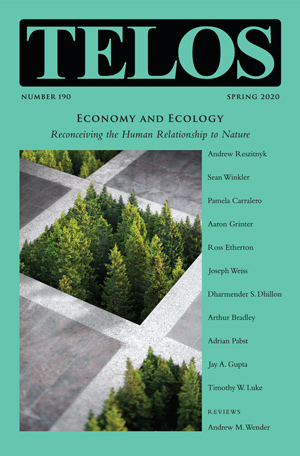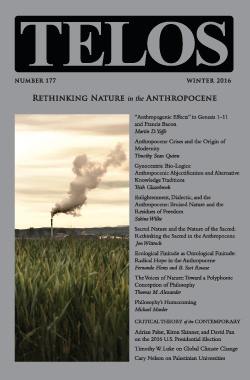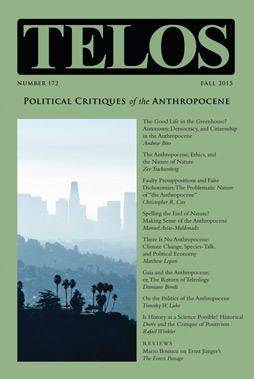The new issue of the journal New Political Science features a review symposium on Timothy W. Luke's Anthropocene Alerts: Critical Theory of the Contemporary as Ecocritique, published by Telos Press Publishing. For one week only, save 30% on your purchase of Anthropocene Alerts by using the coupon code ALERTS30 during checkout in our online store.
|
Pamela Carralero’s “Scientific Modeling and the Environment: Toward the Establishment of Michel Serres’s Natural Contract” appears in Telos 190 (Spring 2020): Economy and Ecology: Reconceiving the Human Relationship to Nature. Read the full article at the Telos Online website, or purchase a print copy of the issue in our online store. Individual subscriptions to Telos are available in both print and online formats. Placing Serres in conversation with Bruno Latour and Jacques Rancière, this article argues that Serres provides the tools to theorize models as mediums through which to acknowledge and interact with the environment as that which is innately inaccessible to human knowledge. This is a first step toward establishing what he calls a “natural contract,” a union of life-giving reciprocity between humans and nonhumans that offers new conceptualizations of knowledge and science as practices free from the totalizing codifications of human verdicts. More specifically, this article imagines models as gateways between the inaccessible and accessible, arguing their value as a setting for the construction and play of scientific interpretations. It concludes by examining the relationship between modern climate models and the inaccessible in order to propose a techno-scientific, intra-temporal mentality of uncertainty from which a natural contract can develop. Telos 177 (Winter 2016) is now available for purchase in our store. Telos 172 (Fall 2015) is now available for purchase in our store. Thus, noxious by-products of production and consumption ironically become the crown of commodified creation at the end of history, whose ultimate historical ends, as Fukuyama reaffirms, are tied to the “endless accumulation” of wealth. Little did he know, this outcome also would entail nonstop increases in greenhouse gases and rapid climate change; but, environmentalists, historians, sociologists, and technologists are more than willing now to seize upon this curious outcome for the crisis narratives of a universal history framed by the concept of “the Anthropocene.” |
||||
|
Telos Press Publishing · PO Box 811 · Candor, NY 13743 · Phone: 212-228-6479 Privacy Policy · Data Protection Copyright © 2025 Telos Press Publishing · All Rights Reserved |
||||





